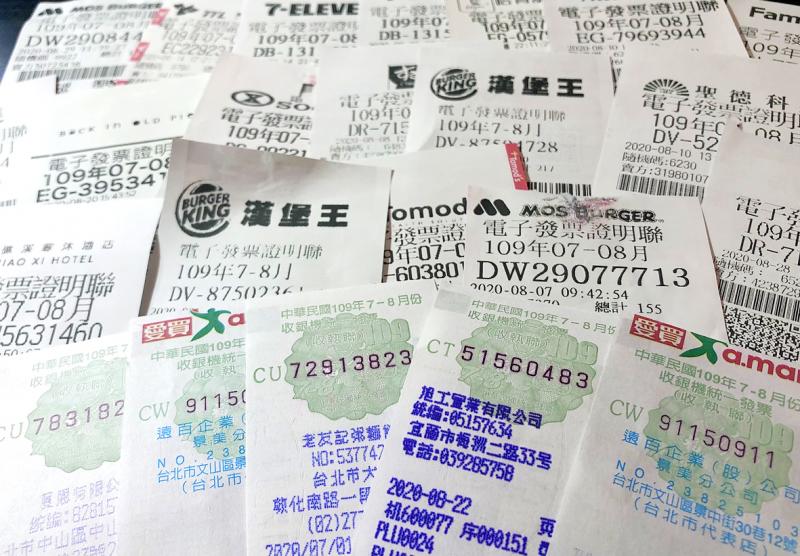Six uniform invoices that each won the special prize of NT$10 million (US$347,186) in the July-August draw remain unclaimed, while another 11 that won the NT$2 million prize also remain unclaimed, the Ministry of Finance said yesterday.
The ministry urged the winners to claim the money ahead of the deadline of Jan. 5, adding that the draw for uniform invoices issued during the September-October period is scheduled to be held tomorrow.
The six unclaimed NT$10 million invoices were among 22 winners who won the prize with a winning number of 13362795, while the 11 unclaimed NT$2 million prizes were among 21 winners with the winning number 27580166, the ministry said.

Photo: CNA
Of the six unclaimed NT$10 million prizes, two invoices were for a packet of cigarettes, the ministry said, adding that one was a NT$90 purchase at an OK Mart in Taipei’s Beitou District (北投), while the other was for NT$125 spent at a 7-Eleven in Kaohsiung’s Gangshan District (岡山).
Meanwhile, two of the four other invoices were issued in Tainan — NT$500 for fuel bought at a gas station and NT$2,830 for food at a supermarket in An-nan District (安南), the ministry said.
The other two were for food purchased at a Taipei restaurant and via Uber Eats.
The 11 unclaimed NT$2 million invoices ranged from NT$10 spent buying a tea egg at a 7-Eleven in Taoyuan’s Yangmei District (楊梅) to NT$1,770 spent at a restaurant in Taichung.

Taiwan Transport and Storage Corp (TTS, 台灣通運倉儲) yesterday unveiled its first electric tractor unit — manufactured by Volvo Trucks — in a ceremony in Taipei, and said the unit would soon be used to transport cement produced by Taiwan Cement Corp (TCC, 台灣水泥). Both TTS and TCC belong to TCC International Holdings Ltd (台泥國際集團). With the electric tractor unit, the Taipei-based cement firm would become the first in Taiwan to use electric vehicles to transport construction materials. TTS chairman Koo Kung-yi (辜公怡), Volvo Trucks vice president of sales and marketing Johan Selven, TCC president Roman Cheng (程耀輝) and Taikoo Motors Group

Among the rows of vibrators, rubber torsos and leather harnesses at a Chinese sex toys exhibition in Shanghai this weekend, the beginnings of an artificial intelligence (AI)-driven shift in the industry quietly pulsed. China manufactures about 70 percent of the world’s sex toys, most of it the “hardware” on display at the fair — whether that be technicolor tentacled dildos or hyper-realistic personalized silicone dolls. Yet smart toys have been rising in popularity for some time. Many major European and US brands already offer tech-enhanced products that can enable long-distance love, monitor well-being and even bring people one step closer to

RECORD-BREAKING: TSMC’s net profit last quarter beat market expectations by expanding 8.9% and it was the best first-quarter profit in the chipmaker’s history Taiwan Semiconductor Manufacturing Co (TSMC, 台積電), which counts Nvidia Corp as a key customer, yesterday said that artificial intelligence (AI) server chip revenue is set to more than double this year from last year amid rising demand. The chipmaker expects the growth momentum to continue in the next five years with an annual compound growth rate of 50 percent, TSMC chief executive officer C.C. Wei (魏哲家) told investors yesterday. By 2028, AI chips’ contribution to revenue would climb to about 20 percent from a percentage in the low teens, Wei said. “Almost all the AI innovators are working with TSMC to address the

Malaysia’s leader yesterday announced plans to build a massive semiconductor design park, aiming to boost the Southeast Asian nation’s role in the global chip industry. A prominent player in the semiconductor industry for decades, Malaysia accounts for an estimated 13 percent of global back-end manufacturing, according to German tech giant Bosch. Now it wants to go beyond production and emerge as a chip design powerhouse too, Malaysian Prime Minister Anwar Ibrahim said. “I am pleased to announce the largest IC (integrated circuit) Design Park in Southeast Asia, that will house world-class anchor tenants and collaborate with global companies such as Arm [Holdings PLC],”